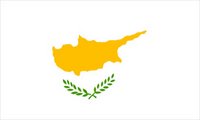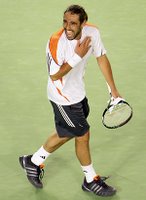
My yia yia and papou would be proud....
For those of you who are not Greek, yia yia means grandma and papou means grandpa.....and they both would be proud of what could happen in Saturday’s Australian Open tennis championship.....
They didn’t know a tennis ball from a basketball, but they would have been paying attention to the kid named Marcos Baghdatis....
What makes Baghdatis special to my family is that he is not just Greek....but he is actually a Cypriot – from Cyprus – the birthplace of my father’s family....
Greek athletes usually don’t do well in the worldwide sports scene....and Cypriots hardly ever do well.....the most well known Cypriot athlete is most famous for his blundering attempt at passing the ball in the Super Bowl than for his kicking ability – Garo Yepremian of the Miami Dolphins....
So on Saturday I will sit back and watch the kid from my yia yia’s island take on Roger Federer.....this is like the Columbus Clippers taking on the New York Yankees in baseball.....or Youngstown State playing Ohio State in college football....
More than likely Baghdatis will not prevail against maybe the greatest tennis player of all-time....he is 0-3 lifetime against Federer.....yeh, I know he beat Andy Roddick earlier in the week, but Roddick has been punked by just about anyone of late....
Win or lose, Baghdatis at least he made his native Cypriots proud....Yasou!!!!
The match is Sunday morning at 3:30 a.m. on ESPN2
The following article appeared on ESPN.com
MELBOURNE, Australia -- The village in Cyprus from which 20-year-old Marcos Baghdatis hails is called Paramytha. Loosely translated, it means "fairy tale." It's near the resort city of Limassol, on the southern coast of the island nation, at the edge of the crystal-blue waters of Akrotiri Bay.
When Baghdatis left home at 13 to go train at the Mouratoglou/Brett Tennis Academy near Paris, there was no way of knowing how his story would turn out.
Multitudes of other ambitious young players make similar journeys, and for every one that manages to make a living playing professionally, thousands end up taking court reservations and teaching the finer aspects of the backhand volley to grateful hackers at the Club Meds and tennis resorts of the world.
While Baghdatis enjoyed a large measure of success as a junior player, winning the junior Australian Open title in 2003 and ending the year as the top-ranked junior in the world, his professional career has been slow to take flight.
Until late in 2005 at any rate, when he began working again with coach Guillaume Payre (who incidentally is the stepfather of Baghdatis' girlfriend, Camille Nevieve) and then reached his first tour final in October in Basel, Switzerland, where he lost in four sets to Fernando Gonzalez of Chile.
Now, on the eve of the biggest match of his career, an Australian Open final Sunday evening against top seed
 Roger Federer, Baghdatis' rise to prominence is being celebrated not as a solo act but as a shared community triumph.
Roger Federer, Baghdatis' rise to prominence is being celebrated not as a solo act but as a shared community triumph.Melbourne has the third-largest Greek community in the world, after Athens and Thessaloniki, and Baghdatis has been cheered on by an armada of chanting, flag-waving supporters, including nine of his uncles and 21 cousins. This has put a strain on his ability to come through with enough tickets for his gang, as players are typically allocated six tickets for each match they play.
"They helped me a lot throughout these two weeks, especially the Greek Army, like you call them," Baghdatis said. "They're fantastic, just amazing. They are [making] the atmosphere, like, amazing."
The Cypriot government has also gotten into the act, deciding after its new-found favorite-son's semifinal victory Thursday night to fly Baghdatis' parents to Melbourne in time to watch their son play in the final and to pick up all their expenses in Australia.
Cypriot President Tassos Papadopoulos saluted Baghdatis after his 3-6, 5-7, 6-3, 6-4, 6-4 victory over fourth-seeded David Nalbandian.
"I warmly congratulate our compatriot for his impressive advance to the Australian Open final," he said in a statement. "His fighting spirit, patience, strength of character with which he competed today provides a shining example for all those young men and women of our country."
Ironically, not a single Greek or Cypriot journalist is among the more than 1,300 accredited media here in Melbourne, though word is a couple of them are scrambling to make it down for Sunday.
Up until now, tennis just hasn't been a big deal in Cyprus, where it is largely viewed as an elitist sport in a nation not renowned for its physical fitness.
Charlie Charalambous, a columnist for The Cyprus Weekly, wrote: "How a Cypriot got to be ranked among the world's best [tennis players] defies logic on an island where we eat ourselves fitter."
It all makes for heady stuff for an emotional player barely out of his teens, ranked No. 54 coming into the tournament. His fourth-round showing here last year had stood as his best performance at a major.
He had earned just shy of $400,000 as a professional before this tournament began, and is assured of at least $600,000 simply for advancing to Sunday night's final. He'll double that paycheck with a win, potentially tripling his career earnings.
Not a bad day's work.
He's got some history with the previously invincible-looking Federer, extending the Swiss to four sets in the second round of the 2004 U.S. Open and losing to him again in straight sets in the quarterfinals in Doha, Qatar, earlier this month.
But Federer has shown flashes of appearing mortal in Melbourne, ever since he let Germany's Tommy Haas climb back from a two-set deficit to make things interesting for the top seed in the fourth round.
Then Nikolay Davydenko held six set points to take a two-sets-to-one lead on Federer in the quarterfinals, but the six-time major winner beat back the challenge and advanced in four tough sets.
And while Federer has a charming cow named Juliette back home in Switzerland, Baghdatis has an entire country and a proud culture firmly behind him.
It's been Greek Pride week the past few days at Melbourne Park, with the atmosphere in Rod Laver Arena when Baghdatis plays befitting a World Cup soccer contest more than a genteel tennis match.
After his five-set win over seventh-seeded Ivan Ljubicic in the quarterfinals, Baghdatis said, "Everybody [is] in the streets right now [in Cyprus]. Everybody, they're having fun, today stopped working to see my match, or took a television at work. I mean it's just an amazing day for Cyprus, for me, for my family."
There are times when the most dangerous opponent is one who has nothing to lose, who can swing from the heels and aim for the stars. One who's too young to be jaded by the oncoming freight train of fame and notoriety that is many a prominent athlete's eventual destiny.
For a slew of seeded men in Melbourne, that opponent has been Baghdatis. He's mowed down, in short order, No. 17 Radek Stepanek, No. 2 Andy Roddick, No. 7 Ljubicic and No. 4 Nalbandian on his way to the final.
If Baghdatis is to become the most improbable men's Grand Slam winner since unseeded Gustavo Kuerten won the French Open in 1997 (while ranked No. 66), he'll need to continue to ride the wave of emotion, skill and serendipity that has seen him through to the final two. Because this affable Cypriot is not long for scouting his opponents.
Asked whether he had seen any of Federer's matches in Melbourne, Baghdatis answered: "No, no. Don't like watching tennis."
No comments:
Post a Comment